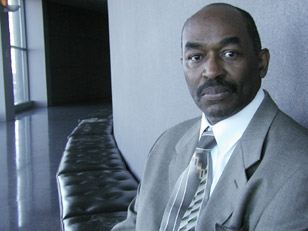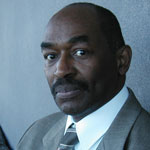
Franklin Thompson (Photo: Jennifer Linzer)
Franklin Thompson, a decorated Vietnam War veteran with a debilitating narcotics addiction, was convicted in 1997 of the murder three and a half years earlier of Jacqueline Okai, a 41-year-old prostitute in Joliet, Illinois.
At 3:30 a.m. on February 6, 1994, police were dispatched to the home of Robert Ezell in response to a 911 call in which a woman could be heard screaming for help. When their knocks went unanswered, the police broke down the door and handcuffed Ezell, who said his nephew had been playing with the phone and must have accidentally dialed 911. After looking around and seeing no sign of foul play, or of a woman, or, for that matter, of a nephew, the police removed the handcuffs and left.
About two hours later, Okai’s body was discovered by a Joliet police officer in a school parking lot. She had been severely beaten and run over by a car. Investigators soon learned that she had been at a party at the home of James Culpepper the evening before her death. Police interviewed the known party guests, among whom was Franklin Thompson. He told police that, at some point during the party, he had driven Okai to her parents’ home, where she had picked up $20. When they returned, Okai had used the money to buy crack cocaine from Culpepper.
Ezell, who had not been at the party, was not interviewed again until five months later, when he refused to identify the woman whose voice was heard during the 911 call. At that point, police played a tape of the call for Okai’s sister and mother, who identified the voice as Okai’s. Despite the evidence suggesting that Ezell might know something about the murder, the investigation fell dormant. It was not revived until two years later when Brian Lewis, the officer who had found Okai’s body in the school parking lot, was assigned to the homicide-investigation unit of the Joliet Police Department. Lewis asked Thompson to come to the police station to discuss the case, and he agreed. Lewis waved a file folder in front of Thompson, declaring that it contained overwhelming evidence that he had run over Okai.
Thompson, whose drug addiction had recently cost him a well-paying factory job he had held for 25 years, wrote and signed this statement placing himself at the murder scene but portraying Okai’s death as accidental. Two weeks later, based solely on the statement, a Will County grand jury returned an indictment charging Thompson with first-degree murder and alleging that he had run over Okai with his 1991 Pontiac Sunbird.
At Thompson’s trial in September 1997, state forensic experts acknowledged that they had found no physical evidence linking him to the crime. His DNA was not present. He was excluded as the source of hairs recovered from her clothing. Tire prints at the scene did not match the tires on his Sunbird. Nonetheless, a jury found Thompson guilty and he was sentenced to 24 years in prison by Will County Circuit Court Judge Stephen D. White. After the Third District Illinois Appellate Court affirmed Thompson’s conviction and sentence in 1999, Thompson’s family contacted the Center on Wrongful Convictions.
Center attorney Jane Raley became convinced of Thompson’s innocence and filed a post-conviction petition on his behalf, which the trial court denied. Thankfully, Raley also sought a gubernatorial pardon based on Thompson’s actual innocence. Governor George H. Ryan granted this request on January 11, 2003, shortly before leaving office, and Thompson was exonerated and freed after serving more than six years and three months in prison.

